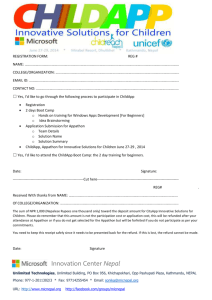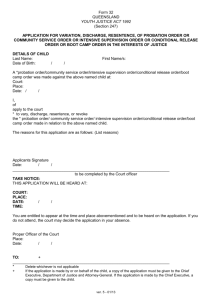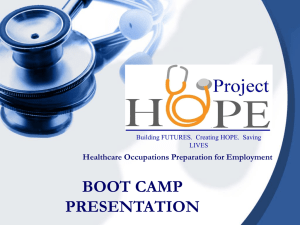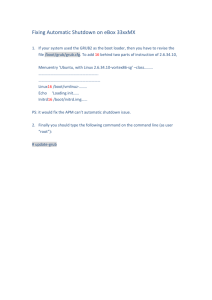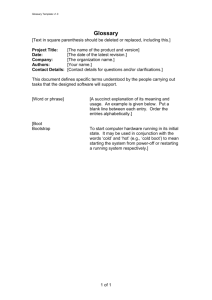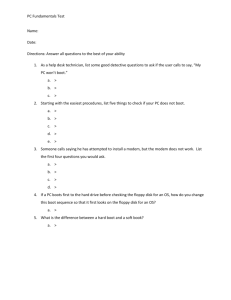Business Analyst Boot Camp for UI Subject Matter Experts (SMEs)
advertisement
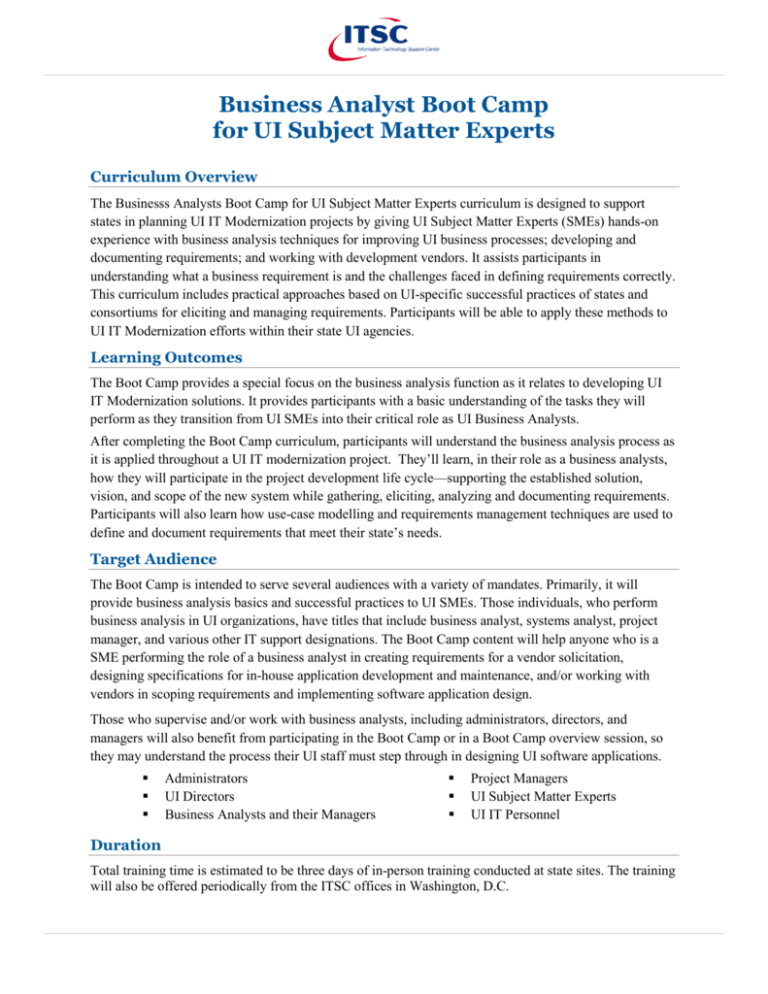
Business Analyst Boot Camp for UI Subject Matter Experts Curriculum Overview The Businesss Analysts Boot Camp for UI Subject Matter Experts curriculum is designed to support states in planning UI IT Modernization projects by giving UI Subject Matter Experts (SMEs) hands-on experience with business analysis techniques for improving UI business processes; developing and documenting requirements; and working with development vendors. It assists participants in understanding what a business requirement is and the challenges faced in defining requirements correctly. This curriculum includes practical approaches based on UI-specific successful practices of states and consortiums for eliciting and managing requirements. Participants will be able to apply these methods to UI IT Modernization efforts within their state UI agencies. Learning Outcomes The Boot Camp provides a special focus on the business analysis function as it relates to developing UI IT Modernization solutions. It provides participants with a basic understanding of the tasks they will perform as they transition from UI SMEs into their critical role as UI Business Analysts. After completing the Boot Camp curriculum, participants will understand the business analysis process as it is applied throughout a UI IT modernization project. They’ll learn, in their role as a business analysts, how they will participate in the project development life cycle—supporting the established solution, vision, and scope of the new system while gathering, eliciting, analyzing and documenting requirements. Participants will also learn how use-case modelling and requirements management techniques are used to define and document requirements that meet their state’s needs. Target Audience The Boot Camp is intended to serve several audiences with a variety of mandates. Primarily, it will provide business analysis basics and successful practices to UI SMEs. Those individuals, who perform business analysis in UI organizations, have titles that include business analyst, systems analyst, project manager, and various other IT support designations. The Boot Camp content will help anyone who is a SME performing the role of a business analyst in creating requirements for a vendor solicitation, designing specifications for in-house application development and maintenance, and/or working with vendors in scoping requirements and implementing software application design. Those who supervise and/or work with business analysts, including administrators, directors, and managers will also benefit from participating in the Boot Camp or in a Boot Camp overview session, so they may understand the process their UI staff must step through in designing UI software applications. Administrators UI Directors Business Analysts and their Managers Project Managers UI Subject Matter Experts UI IT Personnel Duration Total training time is estimated to be three days of in-person training conducted at state sites. The training will also be offered periodically from the ITSC offices in Washington, D.C. Business UI 101Analyst TRAINING BootFOR Camp VENDORS for UI SMEs Transitioning from the Role of UI SME into UI BA Improving UI Business Processes Gathering, Documenting, and Managing UI Requirements Writing Effective UI Use Cases and Requirements Selecting and Working with Development Vendors Agenda Agenda Agenda Agenda Agenda - What is Business Analysis and What Does a Business Analyst Do? - What is a Business Process? - What is a Use Case? - Advantages of Use Cases - The UI BA Role in the Development Initiation Stage of Modernization Readiness - The UI BA’s Role in Modernization Readiness and the Software Development Life Cycle - As Is vs. To Be Analysis - Discussion of concepts as they arise in the use case review - How the UI BA may be Involved in the RFP Review Process - Use Cases and Project Scope - The UI BA’s Contribution in Discovering and Documenting Requirements - Other State/Consortium Processes - What is a Requirement? - RFP-ready Requirements and how they fit into Modernization Readiness and the Software Development Life Cycle - Business Rules and What Drives Them - Categorizing Requirements - Gathering Quality Requirements - Documenting Requirements - Validating and Packaging Requirements - Leveraging the Work of Other States and Consortiums - Role of the Vendor in the Modernization Project - Top-down Development - Business Process Improvement Methodologies - Traceability in Business Process Improvement - Writing an RFP-ready Use Case - Use Case Diagrams - Traceability and Use Cases - Managing Use Cases - Relationship of UI BAs to Vendor BAs - Varying Vendor Development Methodologies and How they Affect the Role of the UI BA - UI BA Interaction with the Vendor throughout the Software Development Life Cycle Activities Activities Activities Activities Activities - Participate in a Group Session to Elicit and Document Requirements - Lighthearted look at a large organization improving its business processes - Identifying Good Requirements - Compare and Contrast a List of Requirements from Other States - Participate in a Vendor-led JAD Session Notes - Write an Improved Business Process - Classes are ‘standalone’ and can be taken out of order - The classes are instructor-led, in-person training - Content is adjusted to meet the needs of each class - The complete curriculum requires 3 full days of training Notes - Not intended to be a complete class in Business Process Reengineering - Discusses the UI Business Analyst’s role in Refining Business Processes BUSINESS ANALYST BOOT CAMP - Changing Poor Requirements to Good Requirements - Good and Bad Business Rules - Functional and Non-functional Requirements - Tracing Business Rules to Use Cases/ Functional Requirements - Comparing and Contrasting Use Cases from Other States - Complete an Incomplete Use Case - Build a Test Case - Compare Design-Ready Use Cases from States & Consortiums - Write a Use Case Notes Notes - Overall scope of this class is to provide SMEs with skills and understanding to effectively interact with the development vendor - Use Cases are high-level, suitable for use in an RFP 1
